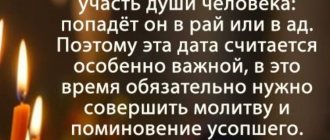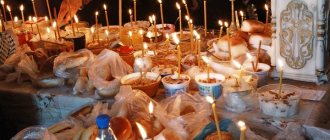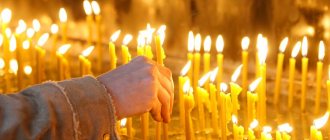After a funeral, it is important to express grief through prayer and mourning, and Orthodox tradition prescribes commemorating the deceased within forty days. Outwardly, this is expressed in wearing dark-colored clothes and consciously refusing to engage in fun and recreational activities. There are pious customs: distributing the things and clothes of the deceased to those in need, giving alms, treating the poor, the elderly and children to meals.
When three days have passed:
After the last shovel of earth has been thrown, wreaths, flowers and photos of the deceased are placed on the grave. A wooden cross is placed on the grave, then it can be replaced with a monument or slab.
You can remember the deceased directly at the grave. The workers who helped bury the grave should also be treated to ritual dishes. Meals and treats are a form of alms that we donate to other people. And the function of this tradition is only to make the person who treats someone feel peace and remember the deceased with a kind word. For this reason, a meal without prayer and to maintain form will not bring benefit to the person who has left this world.
And, according to folk tradition, the wake...
A funeral service is not a church tradition, but the Church allows its existence. The funeral includes remembrance with prayer and a meal.
…on the third day
They are commemorated in honor of the resurrection of Christ and in honor of the image of the Holy Trinity. The first two days after death, it is believed that the soul remembers its good and bad deeds, soars above the Earth with the Angel in places that remind it of earthly happiness and sorrow. On the third day, the Lord calls the soul to Himself. The soul appears before the face of God, and loved ones on earth remember it with prayer and kind words, thereby helping. On this day, after the burial, a funeral dinner is held. The table is set either at home where the deceased lived, or in a neutral place - the main thing is not to make a drunken feast out of commemoration and farewell.
...on the ninth day
They commemorate it precisely on the ninth day to the glory of the nine angelic ranks, which intercede with God for mercy on the deceased. For the previous six days, the soul, together with the Angel, has been in paradise and contemplates its beauty. These days she thinks about the life she lived on earth. And on this day the soul again appears before God.
...on the fortieth day
On the fortieth day after the funeral, it is determined where the soul of the deceased will reside until the Last Judgment: in hell or heaven. Also, forty days is the period after which Jesus Christ ascended to heaven after his resurrection. The prophet Moses fasted for 40 days on Mount Sinai, after which he received the Tablets of the Covenant from God.
…one year later
The largest liturgical cycle lasts a year. When the new year begins, the fixed Christian holidays are repeated anew. They commemorate this day because the date of death is the birthday in eternal life.
Funeral speeches and condolences regardless of religion
The secular farewell ritual involves expressing condolences and support to the relatives of the deceased. In this situation, it is important to find short, succinct, appropriate phrases, for example: “Please accept our sincere condolences and our help,” “He meant a lot to me and to you, I mourn with you,” “We will always remember him as a bright and kind person.” . You can always contact us for support."
At a civil memorial service and at a memorial meal, it is customary to talk about the good deeds of the deceased, to express hope for a bright and long memory of him. This type of speech is best prepared in advance. This can be done independently, based on generally accepted rules and personal attitude towards the person who has passed away, or with the help of an experienced specialist who is entrusted with organizing the funeral ceremony.
Days and holidays when it is customary to come to the grave
Arriving at the grave, it is customary to pray in your own words for the deceased or to perform a litiya - a short rite of requiem. You can read Psalm 91 and the Lord's Prayer. It is important not only to correct and renew the monument and fence, plant flowers and small trees, but also to remember a loved one with kind words. By these actions, the living seem to be caring for the soul of the deceased and reminding themselves of their own connection with eternity.
Memorial Days:
- birthday of the deceased;
- day of death;
- Day Angel.
Ecumenical funeral services
Parental Saturdays of the second, third and fourth weeks of Great Lent
During these days of Great Lent, the church calls to be in Christian love and peace with both the living and the dead. It is necessary to perform prayers in remembrance of the departed on these days.
Meat Saturday
The week of the same name is dedicated to a reminder of the Last Judgment. In the name of this, the Church asks not only for living people, but also for all those who have died from time immemorial and who lived in piety. They especially pray for those who died a sudden death. The Church prays to the Lord for their forgiveness. Such church commemoration brings great benefit to the souls of the dead.
Saturday Trinity
This holiday was established in honor of the event of the descent of the Holy Spirit, which completed the economy of human salvation, and the deceased also participate in this salvation.
The death of a loved one - what should a Christian do?
The website of the Saratov diocese “Orthodoxy and Modernity” received questions on a very complex and painful topic: the death of a loved one - what should a Christian do? We asked Metropolitan Longin of Saratov and Volsk to answer them.
— Vladyka, the questions that came to our editorial office are of concern to many.
It is no secret that the traditions of Christian burial and remembrance of the dead have been largely lost... - Yes. That is why I would start this conversation with something else. A little earlier: not with what to do when a person dies, but what to do when he dies.
The complete destruction of church life in our country for many decades has led to a very difficult situation: the large, overwhelming part of our people, including baptized Orthodox people, leave for another world unprepared, that is, without a final farewell. Just some time ago this was completely unthinkable. And now we see that, firstly, out of ignorance, and secondly, out of superstitious fear, people do not prepare for death.
—What is the preparation for death?
- This is necessarily unction, confession and Communion. Those Christians who prepare to stand before God strive to do so with a clear conscience. But today it is extremely rare for a priest to be invited to visit the sick or dying - they are afraid. A superstition has taken root that unction, which is called the sacrament of healing, is something that is performed exclusively on the dying. And it happens that even if one of the relatives suggests: “Let’s call the priest?” - the patient himself answers: “Are you already planning to bury me?” It turns out that a person clings to life with all his might, even realizing that it is ending, and instead of thinking about how to adequately complete his life’s journey - repent of sins, take communion - he cannot and does not want to agree with the inevitability of the imminent of death. Just the other day we were talking with one priest, and he said: “You know, Vladyka, how many times I have been performing unction lately (and unction is a rather long sacrament, the sick person is anointed with blessed oil seven times) - and I don’t have time to finish: they die during Unction." This suggests that relatives do their best to delay a person’s participation in the sacraments and invite a priest when the dying person has already left—and this is literally a rare case. People have absolutely no idea what the last parting words are and how important it is for a person. This is a problem in our church life, and it is very acute today.
And then, as usual, some grandmothers and neighbors come and begin to curtain mirrors, TVs, open windows, put glasses with bread and water, or even vodka... I don’t know where these grandmothers and these “customs” come from, the list of which varies depending on the area. This, of course, makes a depressing impression. And this petty, stupid vanity performs the function of “replacing” what is really necessary - prayers to God and remembrance of a deceased loved one.
— Vladyka, how can we pray for those who are dying and for departed loved ones?
“The Church accompanies a person all his life and surrounds his exodus into eternity with special, I would say, touching attention and respect. There are special prayers that can be found in prayer books. There is a canon on the outcome of the soul, which is read when a person dies. There are prayers that are read when a person suffers for a long time and cannot die. And usually after they are read, the soul is released from the body.
After death, a person is washed, dressed, placed in a coffin and the Psalter begins to be read over him. Requiem services are held, then the funeral service in the church. In those days when church life was close and familiar to our people, relatives tried to ensure that the coffin with the body of the deceased spent at least one night before burial in the church. That night the Psalter was also read over him. Orthodox funerals were always held, the meaning of which was slightly different before. It was a meal to which the poor and needy were invited in large numbers. They tried to feed as many needy people as possible so that they would pray for the newly deceased.
— Vladyka, we received the following question: is there some kind of minimum list of what an Orthodox Christian should do upon the death of a loved one, and what is optional?
- All that scum that we just talked about is completely unnecessary: curtaining mirrors, hiding forks, etc. There is no need to follow any “folk customs” under any circumstances. And all these home-grown specialists - old neighbors and others - just need to be politely seen off with God.
It is imperative to start praying for a person from the moment of his death - both for those closest to him and asking for the prayers of the Church. Having dressed the deceased, hidden him and placed him in a coffin, it is necessary to begin reading the Psalter, which will end before burial. After the funeral, the loved ones of the deceased can read the Psalter for nine, forty days, six months - as best you can. It is imperative to serve a memorial service and remember the deceased at the Divine Liturgy. Usually they try to order a sorokoust, that is, a commemoration that will be performed at 40 liturgies. This is the minimum, and at the maximum - you can remember your relatives all your life. Here everything is at the discretion of the relatives - if possible and within their strength.
— Is a wake obligatory? They write to us: “We didn’t always have a good relationship with the deceased, the pain of loss does not always allow us to endure this action, and not everyone, in principle, likes wakes. Is it possible to do without them?
“You see, at its core, a wake is a call to as many people as possible to pray for the deceased. In addition, they also have a purely practical meaning. Relatives and acquaintances usually gather in large numbers for a funeral. If they are believers, Christians, then they go to church and stand at the Liturgy. After the Liturgy, the person’s funeral service takes place; it is quite long. Then everyone goes to the cemetery. It's already past noon. And if you consider that believers come to the Liturgy on an empty stomach, then by the middle of the day everyone is already hungry and tired. Therefore, it is completely natural to organize a wake and invite everyone who came to say goodbye to the deceased to the table. There is nothing reprehensible in this. It is reprehensible if a wake turns into a drinking party and, as sometimes happens, into a brawl. This is, of course, scary. This should not happen under any circumstances. Therefore, the Church encourages people to never drink alcohol at funerals. But this, of course, is difficult, since we already have a “tradition”, in the bad sense of the word, of commemorating with vodka. Someone may begin to be indignant. A Christian here simply needs to show courage, willpower and refuse to drink alcoholic beverages at the funeral and, if it depends on him, not to put them on the table.
— Next question, Master: “Is it obligatory to receive forgiveness from all your acquaintances before their or your death? How do you understand who you need to ask for forgiveness and who you shouldn’t? On the one hand, your conscience may torment you because of childhood grievances, but you won’t write to everyone. Is it worth verbally asking for forgiveness from a close relative without having the mental strength to actually forgive him?”
“I think this is a question from a person who has no idea what Christianity is.” This question itself - “is it necessary to ask for forgiveness from this person, but maybe not from that one” - is not Christian. You need to forgive everyone, and you need to ask everyone to forgive you.
We often talk about humility. There are wonderful words about this by St. Ambrose of Optina: humility is not angry with anyone and does not anger anyone. This is how a Christian should live - without being angry with anyone and without angering anyone. If this happens, you need to immediately ask for forgiveness. And under no circumstances should we try to judge whether a person is worthy or not of our forgiveness.
“I just can’t understand,” our reader writes, “why people can’t be cremated. In Greece, for example, the dead are buried, then, due to a lack of land, they are dug up and seemingly cremated. Why can’t we cremate immediately, since the Lord is omnipotent and can resurrect all the dead from any condition, as they say in Orthodoxy?”
— Indeed, the cremation of the bodies of the deceased is not blessed by the Church. First of all, the position of the Church here is based on the words of Holy Scripture: as you are earth, and to earth you have returned (Gen. 3:19). Man was created by God from the earth, and upon death, man also goes into the earth. The ban on cremation existed back in Old Testament times. It was established in opposition to those pagan beliefs for which cremation was the main type of burial, starting from ancient Rome and ending with eastern exotic cults. That is, cremation has always been not just some convenient, as they sometimes say today, “hygienic” method of burial, but had a religious connotation. Naturally, the people of the Old Testament, who were urged not to follow idolaters, did not accept the so-called “fire burial” - cremation - as an integral part of pagan beliefs. And today we do the same.
By the way, remember that when the Bolsheviks came to power, crematoria became one of the symbols of the new world for them. Many famous figures of Bolshevism were also infected with the occult, and they pushed the idea of cremation with unprecedented persistence. Remember the famous phrase from “The Golden Calf” by Ilf and Petrov: “Well, old man, is it time to go to the crematorium? “It’s time, father, to our Soviet columbarium.” The very first crematorium in Russia, in Moscow, by the way, was built in the church of the Donskoy Monastery. He was so immoderately praised and advertised that it was the most natural demonic possession. This fact itself is quite indicative and suggests that the issue of cremation lay far from being on a practical plane, but on an ideological, I would even say, quasi-religious plane. This is from the same series as the false relics that are still on Red Square.
As for Greece, this is an ancient custom characteristic of the entire Mediterranean. Indeed, after some time, bone remains are dug up there and placed in special rooms - ossuaries. They exist in Western Europe, and in the Orthodox churches of Greece, Romania, and Bulgaria. Cremation has nothing to do with it. And this is not due to a lack of land, but to other customs that have been going on since antiquity.
Thank God, there is a lot of land in Russia. Therefore, talk about the fact that we do not have enough land to bury the dead is, at the very least, dishonest.
The Lord can truly resurrect a person from any substance, any condition. If you look at some ancient historical fresco of the Last Judgment, then there, near the trumpeting angels, usually in medallions, scenes are depicted that are signed like this: “Earth gives up its dead,” “Water gives up its dead,” “Fire...” - and etc. After all, people die for various reasons. But the Lord is able to recreate every person at the resurrection of Judgment.
— People ask us: “People spend large sums on funerals, monuments, etc. Is it possible to save money on a funeral, to do the minimum? After all, on the one hand, the person died, and prayer is more important to his soul than a monument, as it seems to me. On the other hand, many want to honor the memory of the deceased and spend a lot of money on this. How to find a reasonable compromise?
- Indeed, everything should be reasonable. Of course, there is absolutely no point in erecting huge memorials. You get a very unpleasant impression when you come to a cemetery and see that people boast of their wealth to each other even after the death of a loved one, laying an incredible amount of marble on his grave. But not caring at all about the final resting place of our loved ones is also wrong. Therefore, you must do everything modestly, with dignity and decently, as far as your capabilities allow.
Newspaper "Orthodox Faith" No. 23 (618)











